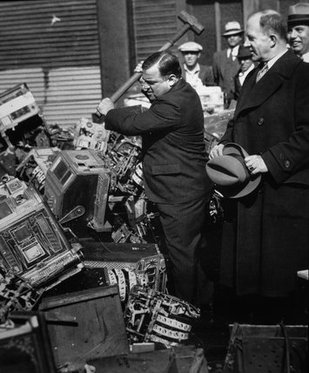
However, not until you see the image of a handful of little-known people doing the same thing a few weeks ago in Albany, N.Y., do you understand the difference all those years make.
In 1934, the mayor of the nation’s largest city saw it as good politics to stand up against the immorality of the idea of giving hard-earned money away to gamblers in the futile hope of getting something in return. Today, people who oppose legal gambling on the same grounds are seen as oddballs. They wield sledgehammers without the help of any smiling politicians. And the gamblers who were getting rich in the old days are now
| | sharing their profits with the government, with a nominal portion going toward education or some other worthwhile purpose. The Albany sledgehammers were swung in opposition to Proposal No. 1 in New York, which would allow as many as seven casinos in that state. Polls show the proposal winning heading into this week’s election. In LaGuardia’s day, gambling was an underground menace associated with organized crime. The United States wasn’t a newcomer to the subject. In the 19th century, legal gambling ventures in several states became racked with scandal. By the early 20th century, governments had zero tolerance for it. Before Arizona and New Mexico became states in 1912, they had to outlaw casino gambling. In 1934, it’s safe to say old-timers still could remember the troubled days of yore. Today, those lessons are as forgotten as the gravesites of those old-timers, and gambling of one sort or another is legal in every state but Hawaii and Utah. And it is spreading. More than a year ago, New Jersey, Nevada and Delaware legalized online gambling. After several months of working out the details, New Jersey’s version is set to hit the Internet later this month. Oh yes, you have to physically reside in the state to access it, but that seems a naïve requirement in an age when even people who reside within dictatorships can find ways to make it appear as if they live elsewhere. The culture of chance is spreading quickly. Only seven years ago, Congress outlawed Internet gambling. Two years ago, the Obama administration enforced that law in a big way, stripping three large offshore poker sites of access to Americans. But then a few months later it reversed itself amid pressure from states that started legalizing online casinos. Now it applies the law to sports betting only. Meanwhile, some in Congress are working on bills that would reverse the earlier law and put an unambiguous stamp of federal approval on online gambling for states that want it. One, by Rep. Joe Barton, R-Texas, would legalize only poker, but another, by Rep. Peter King, R-N.Y., would legalize just about everything. This may be one time where the inability to get Congress to agree on anything will be a good thing. Hard economic times typically have led governments to search for easy money through gambling. That was true even in LaGuardia’s day, when many states legalized wagers involving horse racing and other similar events. But today the economy is not nearly as bad, and yet many state governments are becoming more and more dependent on games of chance. I could present a bunch of statistics to show how social costs outweigh the benefits, or how gambling addictions are spreading nationwide. But the menace of gambling isn’t just about dollars that could be better spent elsewhere. It has more to do with the value of work and the responsibility people have to willingly and directly contribute to their community, state and nation. Or, as a recent editorial in the Christian Science Monitor put it, “Why further the notion that ‘luck’ determines one’s future and that random forces guide events? Government should be affirming the value of ideas and hard work, not a belief in the roll of the dice or the shuffle of a card deck.” LaGuardia couldn’t have said it better himself. |

 RSS Feed
RSS Feed

